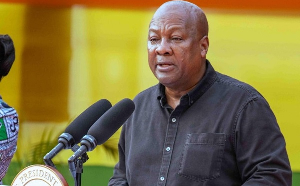Sunyani, May 27, GNA - The National House of Chiefs and Law Reform Commission, with support from GTZ are undertaking a research on the codification of customary law relating to land and family on pilot basis.
Mr Sampson Kwaku Boafo, Minister of Chieftaincy Affairs and Culture who announced this on Tuesday, said it was expected that the results would put an end to chieftaincy conflicts from land issues. He was addressing a day's validation workshop for study on the
"Role of Traditional Authority in Local Governance" in Sunyani. The workshop was organized by the Ministry and Ministry of Local Government, Rural Development and Environment to examine the role of traditional authorities in local governance. It is being attended by about 50 participants drawn from across the country.
Mr Boafo said the project areas for the research were Kpone and Osudoku in Greater Accra Region, Yilo Krobo and Akuapim in Eastern Region, Ho Asogli and Buem in Volta Region, Eguafo and Assin Atandansu in Central Region.
Others are Lower Axim and Sefwi Bekwai in Western Region, Offinso and Tepa in Ashanti Region, Duayaw Nkwanta and Techiman in Brong Ahafo Region, Gonja and Mamprusi in Northern Region, Paga and Bolga in Upper East Region, Nandom and Tumu in Upper West Region.
He gave the assurance that the outcome of the research would assist in the effective resolution of conflicts related to succession to stools and skins.
Mr Boafo said Government acknowledged chiefs as a force to reckon with and major stakeholders in governance at all levels. "It is therefore, in this respect that strategies need to be formulated to facilitate the integration of traditional authorities and strengthen their roles to effectively partner government in the development of the nation," he added.
Mr Boafo noted that traditional rulers successfully partnered the colonial administration to effectively govern the country and played a significant role in the attainment of the nation's independence. He said even though the powers of chiefs had been reduced, majority of the people continued to owe some form of allegiance "as they look up to the traditional authorities for directives in the areas of development within their communities".
Mr Boafo called on Metropolitan, Municipal and District Assemblies to regard traditional authorities as major stakeholders in the development process and involved them in the planning and implementing of projects.
He asked the assemblies not to relegate chiefs to only performing ceremonial functions but collaborate effectively, saying "a call from traditional authorities to their subjects for communal labour is given quick response and are thus regarded as agents of change and development."
Mr Boafo urged the participants to take the workshop serious to achieve its objectives to assist the Ministry to attain its vision of preserving, sustaining and integrating the legal, traditional and cultural values and practices to accelerate wealth creation and harmony for total national development. 2
General News of Tuesday, 27 May 2008
Source: GNA












